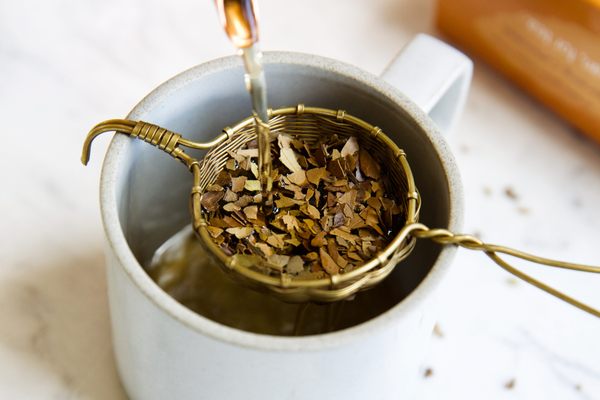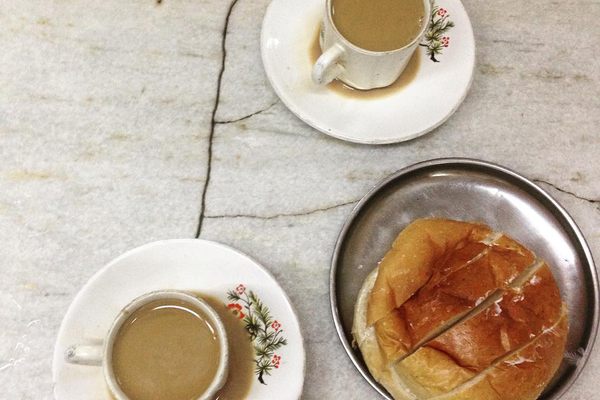People got down to more than jazz in the 1920s. For those who enjoyed a little tango and foxtrot along with a cup of tea, tea dances became must-attend events.
Called thé dansant in French and tanztee in German, the tea dance originated long before the 1920s. It had its share of dissenters, including those who chastised the daring dance styles. Way back in 1853, one American magazine ridiculed the name thé dansant: “Does tea dance? Can it dance?”
Yet as afternoon tea evolved into an important social occasion in the late 19th century, tea dances’ popularity followed. Tea dances especially enjoyed novelty status in the 1910s, when tango and “tango teas” became a sensation in England. Tea and food were increasingly an afterthought. To parents’ alarm, the focus was on dancing. In response, promoters dodging allegations of debauchery—including concerns that proper young ladies would fall for the charms of gigolos—emphasized elegance. The famous dancer Irene Castle even cautioned dancers against getting too close.
Until World War II, people danced over tea from New York to Shanghai. They danced in restaurants and private homes, and hotels hosted tea dances in sunny, plant-filled atriums called palm courts. Orchestras played while couples tried out hip new dance styles.
London’s Waldorf Hilton Hotel began holding tea dances at the start of the trend, though the fun came to a halt in 1939, when a German bomb destroyed the palm court’s glass roof. Tea dances didn’t return until 1982, but aside from a few stops and starts, they continue to this day.
Tea dances have survived in other ways as well. Historical dance enthusiasts occasionally re-create tea dances, and some homes for the elderly hold afternoon dances with tea. In the 1960s, LGBT communities embraced tea dances as a means to disguise same-sex comradery. These days, however, tea dances tend to feature DJs and alcohol instead of orchestras and tea.
Where to Try It
-
Palm Court at the Waldorf
WC2B 4DD, Aldwych, London, England, United KingdomThe Palm Court at the Waldorf is a venerable tea dance venue.
-
Boatslip Beach Club
161 Commercial Street, Provincetown, Massachusetts, 02657, United StatesThis resort hosts an LGBT tea dance every day.
Written By
 Anne Ewbank
Anne Ewbank
Sources
- books.google.com/books?id=d4E4AQAAMAAJ&pg=PA407&dq=%22tea+dance%22&hl=en&sa=X&ved=0ahUKEwi3_Oq_3p3XAhUG5yYKHcrPBfI4FBDoAQgnMAA#v=onepage&q=%22tea%20dance%22&f=false
- boatslipresort.com/tea-dance/
- books.google.com/books?id=FrWgDRkS90EC&pg=PA162&lpg=PA162&dq=tea+dance+palm+court&source=bl&ots=a2iOB29wwQ&sig=FmEjZOgqrVsgPlik9CFiO0syyTg&hl=en&sa=X&ved=0ahUKEwjRmsmGjp7XAhWk6YMKHQjaDtQ4FBDoAQgnMAA#v=onepage&q=tea%20dance%20palm%20court&f=false
- thediplomat.com/2013/09/shanghais-peace-hotel-ushers-in-tea-dance-revival/
- www.teatimemagazine.com/reviving-tea-dances/
- books.google.com/books?id=3wcUCgAAQBAJ&pg=PA40&lpg=PA40&dq=%22tea+dance%22+tango+castle&source=bl&ots=Gv48vqGMOx&sig=Xmo6-Od51ZYmgMzJgIc1RSy8wuY&hl=en&sa=X&ved=0ahUKEwj35b6RpaDXAhVMaRQKHXd0AccQ6AEIVjAN#v=onepage&q=%22tea%20dance%22%20tango%20castle&f=false














